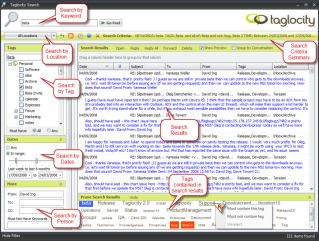Wasted Intellectual Capital
Today’s email systems haven’t kept up with the way office workers use them for knowledge work
A major shortcoming of enterprise email systems today is that they lack integrated knowledge sharing features to support the on-demand discovery of knowledge and business know-how buried in emails. This is valuable intellectual capital – corporate treasure no less.
How is it wasted?
Today’s email systems are still closed channel 'push' communication systems. ‘Closed channel’ communication means the payload gets pushed from point to point (from one to n), and after that each recipient handles the message differently: some delete it; some archive it in one of often more than a 100 folders; some can’t decide which folder to put it in so they make copies and store redundant information in multiple folders; and some may even eventually read it!
‘Push’ means that the recipients don’t have a choice as to what comes to them – the sender decides and so often CCs distribution lists or multiple contacts just in case they may be interested, or need to refer to it sometime in the future because of embedded knowledge or know-how.
But what about stakeholders who are not on the recipient list? Or people who join teams or projects after a lot of knowledge has been transferred via email? Or people who’ve deleted the messages or simply give up searching for it due to the sheer volume of irrelevant results they have to manually decipher?
Also, due to the increasing mobility of knowledge workers, organizations suffer when employees take their knowledge and business intelligence with them. This represents valuable intellectual capital that is routinely wasted, at least from the employer’s perspective.
What if?
Wouldn’t it be great if your email system supported a seamlessly integrated collaborative knowledge sharing solution that:
- allowed senders to publish non-private informational messages to a knowledge repository?
- classified the content in the knowledge repository by tags instead of forcing it into a predetermined corporate hierarchy?
- supported ad-hoc author generated tags, shared group tag collections, as well as machine tags generated by artificial intelligence (“semantic tags”)?
- allowed group users to search the content in the Knowledge Store from within their everyday email client as well as over the Internet from any browser on computer from any location?
- provided fast, relevant search results with built-in tag pruning to quickly “find” instead of “search”?
- allowed group users to subscribe to incoming group content, either by email or RSS, based on powerful user defined queries so that the recipients can decide when and what they receive in their inbox instead of the sender deciding for them ('pull' instead of 'push')?
- made available on-demand knowledge discovery from corporate archives
- provided a Knowledge Store analytical dashboard to show interesting and useful metrics to support collective intelligence
- revealed knowledge locked in emails, and allowed expertise to be extracted?
- ultimately simplified transfer of knowledge and business know-how!
The Answer
The solution to the email knowledge waste problem does not require abandoning email – there will always be the need for the reliable closed channel system of existing email systems for private one-to-few communication.
The solution requires extending existing email systems with an open
collaborative knowledge sharing platform such as Taglocity. Taglocity
compliments existing email systems and it does so without forcing users
to rewire their brains and leave their comfort zone which in turn leads
to enthusiastic user adoption.




